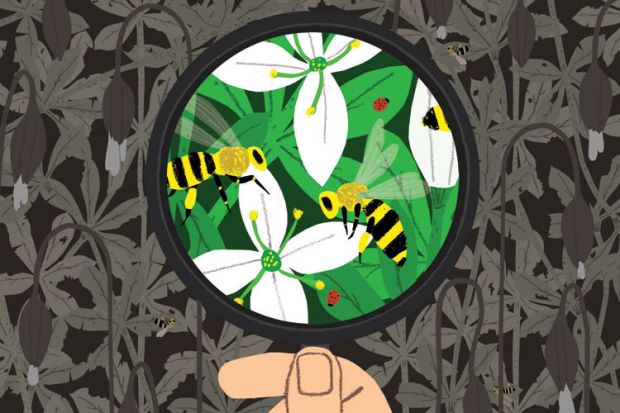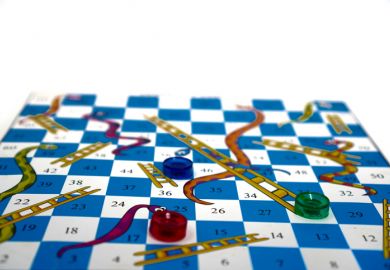Source: Michael Parkin
It is widely accepted that the decline in field biology skills in the UK has reached crisis point. But so what? The ability to identify bugs, flowers and birdsong may be viewed as all rather quaint. Some may consider it little different from the loss of other “traditional country skills” such as basket weaving or morris dancing. However, the lack of field biologists is keeping many people awake at night.
Without recorders who can reliably identify bumblebees, how would we know that our pollinators are at risk and thus our future fruit crops in peril? Without records of first flowering dates, how would we know of the biological reality of climate change? Without identification skills, how would we recognise pest species threatening the economic future of our islands? The legal protection of our Sites of Special Scientific Interest is dependent on these sites containing unusual species; without the ability to confirm the presence of these species, much of our conservation policy has no foundations. Yet it is estimated that each year there are fewer than 10 UK graduates who are proficient enough in field identification skills to be employable. Of these, about half are arts graduates who are recreational (amateur) field naturalists. In contrast, a lack of basket weavers leaves us with a regrettable lack of willow baskets, but is hardly a cause for the national conservation agencies to call crisis meetings.
There are probably a number of reasons that have contributed to the decline in field biology. These include the rise of molecular biology, the loss of staff competent and comfortable in the field, and the general decline in children getting outdoor experience. However, a key factor has to be that the skills involved have been distinctly unappreciated. In fact, we would argue that, in educational circles, this lack of appreciation goes much deeper. Educationalists have been guilty of formalising a gross undervaluing of the complexities involved in field biology. This has occurred through a naive adherence to an incredibly damaging dogma that has influenced so much of modern educational practice. Ironically, the dogma that has been so detrimental to field taxonomy is known as Bloom’s taxonomy.
In 1956, a committee of educationalists chaired by Benjamin Bloom proposed a classification system for learning outcomes. The objective of the group was to clarify the language used in the design of curricula and exams. They produced a theoretical framework that subsequently has been widely used to classify educational goals. There are now literally hundreds of textbooks, web pages and training courses that provide guidance on writing exam questions based around Bloom’s taxonomy. These documents frequently include lists of approved verbs that are deemed appropriate when writing questions for different levels or years of study. Bloom’s creed tells us that the lowest levels of cognitive skills involve recognising, identifying, naming and memorising. These abilities are considered inferior to the higher levels such as critically analysing, evaluating, criticising and reviewing. This sort of simplistic analysis resulted in field biology skills being excluded from university degrees time and time again as being too “simplistic”. However, ask those responsible for dropping these courses to distinguish Galium saxatile from Galium sterneri and they might just start to appreciate that identification skills are not so simple after all.
The Galium example illustrates just why those who blindly follow Bloom’s taxonomy need to learn a little more about biological taxonomy. It is not a trivial skill to be able to differentiate between closely related plants. It is not a simple memory test. Rather, it requires critical analysis and many other higher skills. It demands logical thought processes and the review of a host of information. The final answer is usually arrived at on a balance of probability based on evaluating the likely underlying geology of the site where the plants were found. A field biologist who has read a landscape, reviewed the other co-occurring species and concluded that the specimen was probably G. saxatile, may wish to corroborate this by using a hand lens to determine in which direction tiny hooks along the leaves point. To the naked eye, these two plants look virtually identical. This level of complexity is why taxonomists generally take years to hone their skills, supporting our argument that identification is not a low-level cognitive skill.
Real taxonomists know that there are always cases when things are not black and white. Some things cannot be condemned to belong to one species or another by rote. Bloom’s taxonomists still need to learn this lesson. Sometimes, what appear to be low-level cognitive skills are actually highly complex multifactorial tasks.
We have already lost a generation of field biologists. Moreover, the lack of attention to identification skills has permeated down to primary schools: it seems that the nature table is not something to be taken seriously in this technological age. So university students have had this dismissive message reinforced right through their schooling. If the skill set is not totally to be lost, we need to act now to overcome this inertia and identify identification as a worthy and noble set of complex skills.
Register to continue
Why register?
- Registration is free and only takes a moment
- Once registered, you can read 3 articles a month
- Sign up for our newsletter
Subscribe
Or subscribe for unlimited access to:
- Unlimited access to news, views, insights & reviews
- Digital editions
- Digital access to THE’s university and college rankings analysis
Already registered or a current subscriber? Login





